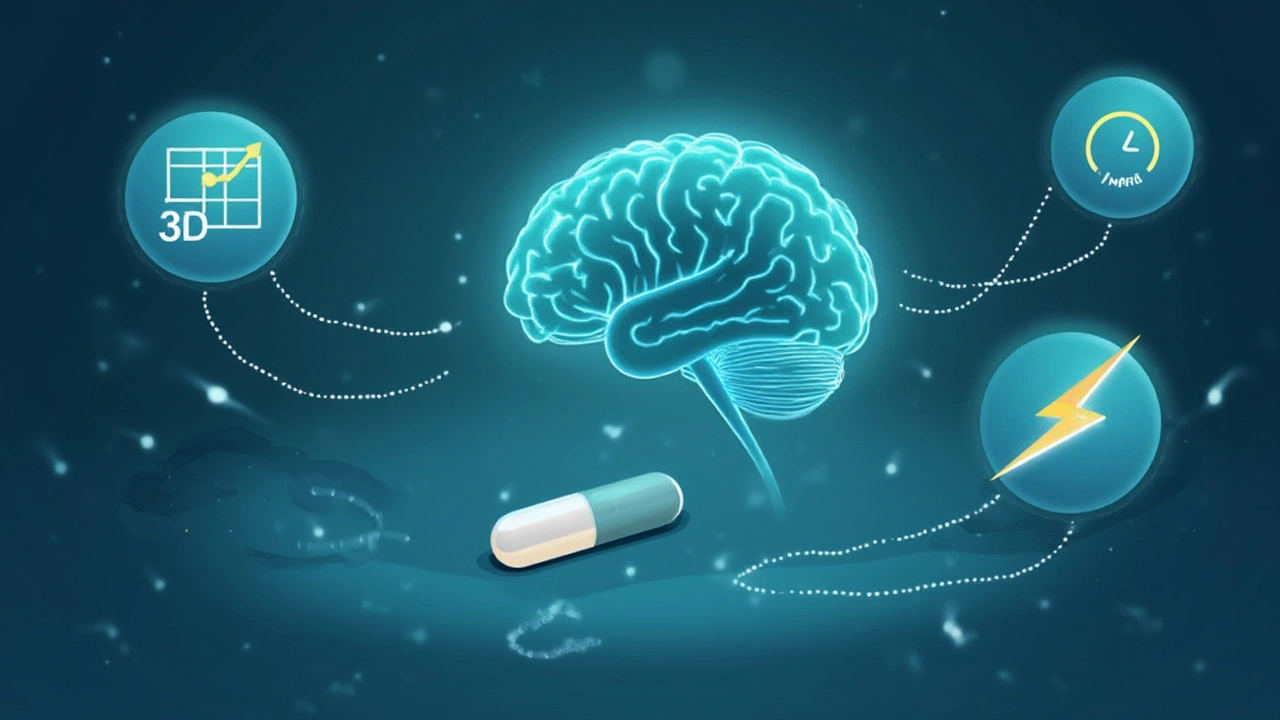
Imagine walking into your teenager's room and finding them staring into space, unresponsive for a few seconds. You call their name, snap your fingers, wave your hand—and suddenly they blink back to life, unaware anything weird even happened. It's scary and confusing. That's how my son Quentin's epilepsy first announced itself. That's when I first heard the word "Depakote." It felt like a lottery—except the prize was a swirl of hope and worry bundled in a little pill bottle.
Depakote is the brand name for divalproex sodium, a form of valproic acid. It first showed up in the U.S. back in 1983. Doctors use it to treat seizures, bipolar disorder, and prevent migraines. For a medication that's been around since Michael Jackson's "Thriller" topped the charts, it’s had plenty of time to gain its reputation.
So, how does it actually work inside the brain? Depakote increases a neurotransmitter called GABA. Think of GABA as sort of the “chill out” chemical in your nervous system. When nerves in the brain start firing too much—like in seizures or certain kinds of mania—Depakote helps them calm down again. Instead of a firehose, you've got more of a steady faucet.
Why do neurologists and psychiatrists reach for this particular bottle? The main draw is flexibility. It tackles several types of generalized and partial seizures, helps smooth out mood swings in bipolar disorder, and cuts down migraine days. This one-medicine-fits-many kind of utility matters, especially for families dealing with more than one diagnosis. With a single medicine, there’s less chaos dealing with pharmacies and school nurse forms.
Here’s a quick look at its main uses in a table — real numbers, real success rates:
| Condition | Approximate Response Rate | Time to Benefit |
|---|---|---|
| Epilepsy (generalized seizures) | 50-60% | Within 1-2 weeks |
| Bipolar Disorder (mania) | Around 60% | Within 1-2 weeks |
| Migraine Prevention | 40-50% | 4-8 weeks |
After starting Depakote, you don't see fireworks. What happens instead is a gentle shift: less frequent seizures for Quentin, steadier moods for people with bipolar disorder, or fewer days crushed by migraines. For most, life gets less scary and unpredictable. I remember charting Quentin’s seizures on a calendar and quietly celebrating the first full month with zero episodes. Sometimes progress is just more days that feel wonderfully ordinary.
In clinics, doctors look for two things after prescribing Depakote: how much the core symptoms change, and what kind of life comes back for the patient and family. Academic studies from big epilepsy centers in the U.S. report that for generalized seizures, about half of patients cut their seizures by at least half. Even better—about 20% go completely seizure-free after a year. In bipolar disorder, Depakote is often picked for adults and teens whose moods swing like a rollercoaster. In controlled trials, it’s been just as effective as lithium (the old stalwart) for stabilizing mania, but with fewer blood tests and less risk to kidneys.
Kids benefit too, but the effects can be trickier. The FDA approves Depakote for kids as young as two years old for certain types of epilepsy, but for mood disorders, it’s a judgment call. Pediatric neurologists will track behavior, appetite, and even school performance. That part is huge—because being able to actually participate in life, not just survive it, is what families really crave.
Of course, you’re never just dealing with the medicine. There’s the hassle of getting blood levels checked (to make sure it’s working but not causing harm), arguments about pill-taking, and endless reminders about not skipping doses. If you can build it into the routine—like linking it to brushing teeth or meals—it’s a lot less likely to get forgotten. Bonus tip from our family: a weekly pill sorter is worth its weight in gold, especially during those foggy school mornings.

No drug is a free ride, and Depakote proves it daily. Some side effects are pretty common (but usually mild): stomach upset, drowsiness, or mild tremor. I’ve watched Quentin yawn extra hard some mornings—that’s about it for him thankfully. Others deal with more. Appetite runs wild for about a third of people on Depakote, and weight gain isn’t rare. Even the packaging recommends regular weight checks. Our family started keeping healthier snacks around, swapping out soda for fizzy water, and moving after dinner walks from a weekend thing to an everyday routine. Little changes like that help keep weight from sneaking up.
Some side effects are less visible, but a lot more serious. About 1 in 500 people develop liver problems—kids under two and those with certain metabolic issues are at higher risk. It’s why doctors push for those regular blood tests, especially early on. Then there’s the question of hair loss. It usually isn’t dramatic, but seeing extra strands in the brush can be unsettling, especially for teenagers. A good multivitamin or biotin supplement can sometimes help, but always talk to your doctor before adding anything.
There are also mental effects to watch: some users report feeling foggy or confused at higher doses. Dropping dose slightly, spreading it across the day, or switching from tablets to sprinkle capsules can help. Quentin needed a lower dose than his friend at school, but both got to the level where seizures stayed away.
Some big warnings—Depakote can cause birth defects if taken during pregnancy. For menstruating girls and young women, this means real conversations about birth control before starting treatment. In rare cases, pancreas inflammation or severe allergic reactions crop up, so watch for sudden pain, swelling, or strange rashes, and don’t hesitate to call the doctor. The most important depakote tip: never stop abruptly. Quick withdrawal can trigger rebound seizures or mood swings, sometimes worse than before.
If you’re new to Depakote, the first month can feel like a blur of pill bottles and clinic visits. Pills come in different sizes (125 mg up to 500 mg) and types—standard, extended-release, and little sprinkle capsules for kids or anyone who hates swallowing big tablets. Dosing starts low and ramps up, with bloodwork along the way to check “valproic acid levels.” The sweet spot for most is 50-100 micrograms per milliliter in the blood, though some do fine a bit outside that range. Side note: even missing a single dose can matter, so keeping a backup dose at school, in a backpack, or at Grandma’s house can save a lot of panic.
With so many types, what’s the safest way to use Depakote day to day? Here’s what worked in our house:

Here’s something that’s changed over the years—Depakote used to be almost the only modern seizure medicine, but now it’s one of many. Still, doctors stick with it because of its broad track record. Generic options have made it cheaper, which matters if you’re worrying about insurance or Medicaid coverage. In 2025, telehealth means lab results and doctor check-ins can often happen from your kitchen table, bringing a little sanity back to scheduling.
Most families and patients want to know about the long haul. Is this something you’re on for life? For many, yes—especially with epilepsy. Others may try “tapering off” under a doctor’s eye once seizures or mood swings have stayed quiet for months or years. Some switch to different meds if side effects build up, or if they hit puberty and their bodies’ metabolism changes suddenly. The key is honest, two-way talks with your doctor: don’t just ask “is it working?” but “is this the best I can do?”
Diet and activity can play a quiet, but powerful, role. Some kids and adults on Depakote gain weight, but regular exercise—even daily walks—make a big difference. Swapping soda for water or tea paid off for Quentin, and turning off screens a half-hour before bed supported better sleep. If you’re running into side effects you can’t manage, don’t be afraid to ask about alternatives or extra support—there’s no prize for toughing it out alone.
For people worried about stigma—taking Depakote doesn’t have to be a big deal. My daughter Verity watches her brother take his medicine every evening, and to her it’s as routine as brushing her own teeth. Making it a normal part of daily life can cut down on shame or secrecy, especially for teens. If your child’s on Depakote, let teachers know about possible side effects like tiredness, and make a plan for missed doses or field trips.
Raja M
14 06 25 / 04:31 AMReading your story about Quentin instantly reminded me of the fragile line we all walk between hope and fear when a seizure lands in the family room.
Depakove, like many anti‑convulsants, is a double‑edged sword: it can calm the storm but it also demands vigilance.
What really struck me was how you turned the pill‑sorting ritual into a tiny ceremony of control – that’s the kind of practical philosophy that keeps chaos at bay.
On the biochemical level, boosting GABA is essentially giving the brain a gentle “stop‑sign” whenever it tries to over‑fire.
One thing many parents overlook is the cumulative effect of slight weight gain; a few extra pounds can feel like a betrayal after months of seizure‑free days.
Balancing diet, exercise, and medication timing becomes an art form, not just a medical checklist.
When you mention the liver monitoring, it’s a reminder that the central nervous system isn’t the only organ that pays the price for seizure control.
Kids especially need that extra layer of reassurance because their bodies process drugs differently than adults.
What I love about your tip of using a pill sorter is that it turns adherence into a habit as natural as brushing teeth.
In my own experience, pairing the dose with a snack that contains protein can blunt the stomach upset that some patients report.
Don’t forget that blood level checks are not just a formality – they’re the most reliable way to stay ahead of toxicity before symptoms appear.
It’s also worth noting that the “sprinkle” capsules you mentioned are a game‑changer for anyone who struggles with swallowing pills, especially younger children.
If you ever feel the dose is too high, a modest split across the day can smooth out the foggy side‑effects that many describe as “brain mush.”
And always, always discuss any birth‑control plans with the neurologist; the teratogenic risk is real, and prevention beats regret every time.
Finally, keep documenting each seizure, side‑effect, and mood swing – the data you collect becomes a powerful ally in conversations with your doctor, and it can prove that Depakote is truly working for your son.
Keep pushing forward; the small victories add up to a life reclaimed from the shadows of epilepsy.
Rob Flores
24 06 25 / 01:51 AMWow, another "miracle" drug that apparently solves everything from seizures to migraines. Guess we’ll just ignore the decades of research that tried to find safer alternatives.
Shiv Kumar
3 07 25 / 23:11 PMOne must acknowledge the sheer elegance of a medication that straddles neurology and psychiatry, albeit with the inevitable trade‑offs that any poly‑purpose agent entails.
Ryan Spanier
13 07 25 / 20:31 PMDear author, your detailed account is commendable. May I suggest that establishing a structured medication log, perhaps using a validated diary app, could further enhance adherence and facilitate clinician review?
Abhinav Moudgil
23 07 25 / 17:51 PMWhat a vivid tapestry of real‑world tips! From a lyrical perspective, the sprinkle capsules are like confetti for the brave – they make the mundane act of dosing feel almost celebratory.
Miah O'Malley
2 08 25 / 15:11 PMThe philosophical undercurrent of your narrative invites us to contemplate the balance between medical intervention and personal agency; it’s a dance where each step reshapes the choreography of daily life.
Bradley Allan
12 08 25 / 12:31 PMHonestly, if we keep glorifying a drug that can cause liver failure, hair loss, and birth defects, we’re just sugar‑coating a medical nightmare!!!
Wake up, people!!!
Kyle Garrity
22 08 25 / 09:51 AMI’m really grateful for the practical suggestions you shared, especially the tip about setting alarms. It’s easy to forget a dose when mornings are chaotic, and a simple reminder can prevent a whole lot of anxiety.
brandon lee
1 09 25 / 07:11 AMGood point.
Joshua Pisueña
11 09 25 / 04:31 AMTotally agree – turning meds into a habit is the secret sauce for success, and you don’t need a PhD to realize that.
Ralph Barcelos de Azevedo
21 09 25 / 01:51 AMWhile your enthusiasm is admirable, let’s not forget that the risk of teratogenicity demands a sober, evidence‑based approach rather than blind optimism.
Peter Rupar
30 09 25 / 23:11 PMOh please, the “evidence‑based approach” line is just a fancy way to say “we’re scared to admit the drug’s flaws.” Stop sugar‑coating the side‑effects!
Nikita Shue
10 10 25 / 20:31 PMYo, the real hack is to keep a spare bottle in the car so school emergencies don’t turn into panic attacks. Trust me, that one move saved my brother’s day.
Heather McCormick
20 10 25 / 20:38 PMBecause obviously the only way to solve this is to tell every American to stop taking meds and just “think positive.” Brilliant logic, truly.
Robert Urban
30 10 25 / 19:44 PMLet’s keep the conversation constructive – sharing experiences helps families navigate the tough balance between efficacy and side‑effects without resorting to blame.
Stephen Wunker
9 11 25 / 17:04 PMConstructive? More like a sanitized echo chamber. Real progress comes from questioning the status quo, not patting each other on the back.
Jhoan Farrell
19 11 25 / 14:24 PM❤️ Thanks for the thorough guide! Really helped me feel less alone in this journey. 🙏
Jill Raney
29 11 25 / 11:44 AM🤔 Interesting… but have you considered that pharma might be pulling strings behind the scenes? 🙄
bill bevilacqua
9 12 25 / 03:31 AMHonestly, i dont see the point in writting all this crazzy long post. Too many numbers and stats, who has time to read?!!!